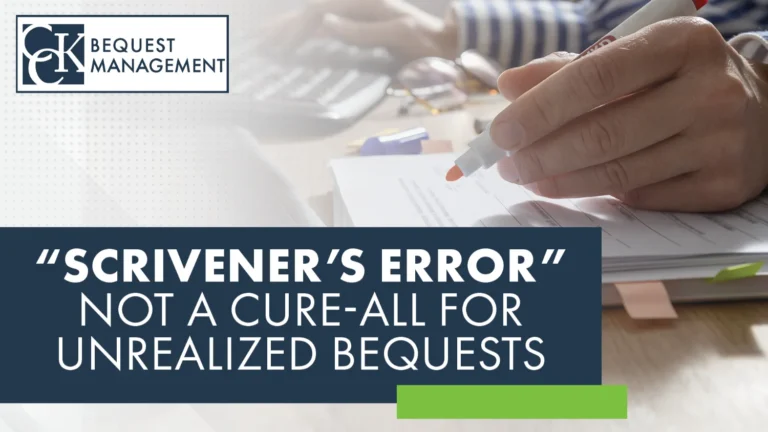“Scrivener’s Error” Not A Cure-All For Unrealized Bequests

When a long-awaited charitable bequest does not materialize, it is a disappointing situation. Most times, there is nothing to be done: the will or trust says what it says. In rare cases, the failure of a bequest can be due to a simple drafting error. If so, bequest managers may look to salvage a gift by invoking the doctrine of “scrivener’s (writer’s) error.” In the case of a true error, the court may “reform” (revise) the will to achieve the right result. This remedy is applied infrequently and only when the error is obvious and virtually undeniable. In most cases, it is meant to correct clerical mistakes.
Estate of Meeks, 421 P.3d 963 (Wash.App. 2018) is a good example of the limits of the scrivener doctrine and an overreaching effort to extend it. After her husband and daughter predeceased her, Mabel Meeks wished to redirect the bulk of her substantial estate to a cancer research charity. The original terms of the joint trust she and her husband created would not have allowed this change. Although Ms. Meeks could have amended the documents, she did not do so prior to her death and the research organization received nothing.
In a failed effort to salvage the bequest, the charity claimed that the drafter of the original trust (years earlier) had failed to capture the Meeks’ then-existing desire for flexibility. In other words, a scrivener’s error of long ago was now depriving a charity of a bequest. Predictably, the original drafting attorney provided a robust response to the accusation of negligence. More to the point, the court found no credible evidence that the Meeks had such an intention years earlier. It was clear that Ms. Meeks’ wishes changed after her daughter’s death. The “scrivener’s error” doctrine is not a shortcut substitute for revising testamentary documents to reflect new intentions.
The scrivener doctrine is more useful in cases such as Estate of Edmonds, 320 A.3d 92 (Pa.Sup. 2024). There, the court revised Edmonds’ will to correct an obvious error (wrong address) in the description of devised real estate so that the beneficiary could receive clear title. (It is especially important for courts to revise wills in which a real estate description is faulty since the will becomes part of the chain of title.)
CCK COMMENT: Bequest managers should be aware of the scrivener remedy even though it is used infrequently. As estate planning continues to change, the limits of the doctrine may be tested. What happens if the boilerplate in a DIY will frustrates the testator’s intention? Is the service provider the scrivener even though it never interacted with the customer? How could it have misinterpreted her intentions?
(This blog was originally posted on our LinkedIn on January 30, 2025.)